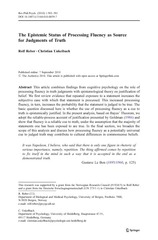The Epistemic Status of Processing Fluency as Source for Judgments of Truth
Peer reviewed, Journal article
Published version
Permanent lenke
https://hdl.handle.net/1956/4350Utgivelsesdato
2010-09-07Metadata
Vis full innførselSamlinger
Originalversjon
https://doi.org/10.1007/s13164-010-0039-7Sammendrag
This article combines findings from cognitive psychology on the role of processing fluency in truth judgments with epistemological theory on justification of belief. We first review evidence that repeated exposure to a statement increases the subjective ease with which that statement is processed. This increased processing fluency, in turn, increases the probability that the statement is judged to be true. The basic question discussed here is whether the use of processing fluency as a cue to truth is epistemically justified. In the present analysis, based on Bayes’ Theorem, we adopt the reliable-process account of justification presented by Goldman (1986)and show that fluency is a reliable cue to truth, under the assumption that the majority of statements one has been exposed to are true. In the final section, we broaden the scope of this analysis and discuss how processing fluency as a potentially universal cue to judged truth may contribute to cultural differences in commonsense beliefs.
Utgiver
SpringerOpphavsrett
Copyright the Author(s) 2010. The article is published under the Creative Commons Attribution Noncommercial License, which allows users to read, copy, distribute and make derivative works for non-commercial purposes from the material, as long as the author of the original work is cited. The commercial rights are protected by Springer.The Author(s).

